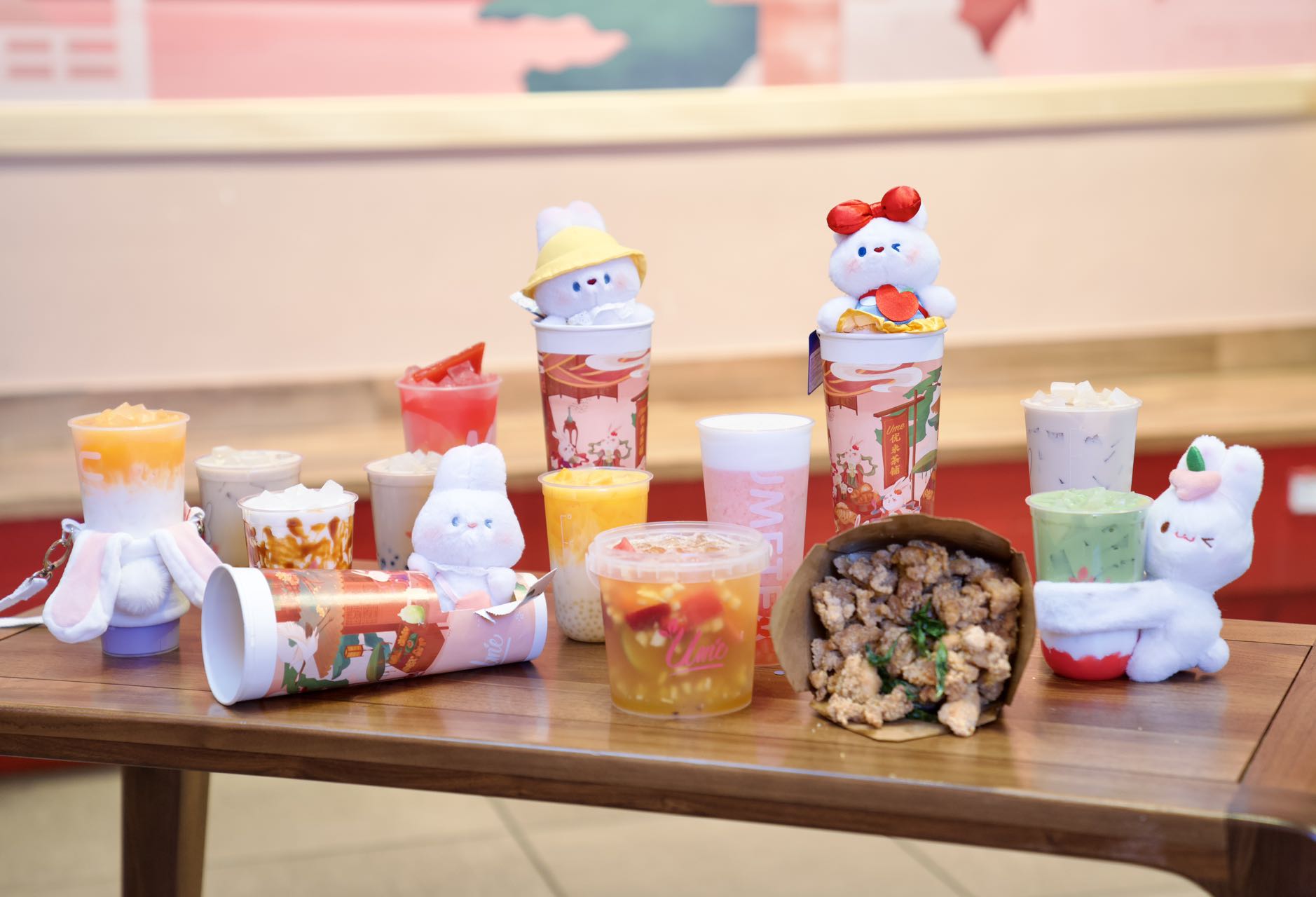A group of teens excitedly picked up their candy-colored bubble tea from Ume in downtown Mountain View. But before they took a sip, they each peeled open the bottom of their paper cups to reveal a cute little plushie inside. “Our tea is not only pretty but also fun,” said Jiachun Li, CEO and co-founder of Ume Tea, in an interview with TechCrunch.
While bubble tea has been in the U.S. since the 1990s, its popularity has largely remained among Asian Americans with a few brands occasionally breaking into other segments. Ume is the latest boba venture aiming to reach a wider demographic, this time by adding mystery toys to the sweet and chewy experience.
The tactic seems to be working so far. On TikTok, a search for “Ume,” which is short for “u & me,” shows several hundred results, many of which are young users posting the surprise plushie bunny, Ume’s mascot, they collect from buying its bubble tea.
Since starting four years ago, Ume has been profitable across its nine locations in California without outside funding. Today it’s announcing its first external financing of $2.2 million from iFly.vc, a venture capital firm that has made a name for backing Asian American-founded startups such as the grocery delivery platform Weee!.
Today, Ume’s outlets are selling an average daily order of 1,000. “Two to three hundred cups a day would already be considered good for a coffee shop,” said Han Shen, founding partner at iFly.vc, in an interview with TechCrunch.
A leaf from Asia’s book
Featuring soft pink walls, plastic cherry blossoms, rabbit toys and K-pop hits in the background, Ume has become a go-to spot where nearby high school and college students do homework and gossip with each other. This kind of leisure activity holds a special place in the hearts of Asian Americans who came of age in the 2000s, and now, the cherished routine is spreading to non-Asian groups.

The majority of Ume’s customers are between 18-35 years old; 70% of them are non-Chinese and 40% non-Asian. “We are seeing a cultural shift,” Li said. “When Gen Z Americans hang out, they prefer standing outside a bubble tea shop with a cool-looking drink to sitting at a café.”
There are just under 5,000 bubble tea stores in the U.S., according to research done by iFly.vc based on Yelp data. Coffee shops, in comparison, reached 38,400 locations nationwide in 2022. Some reports suggest even higher numbers, likely due to different definitions of “coffee shops.”
Shen is betting that bubble tea consumption will eventually evolve into an alternative lifestyle to drinking coffee. “Don’t ever underestimate the bubble tea industry. It’s an incredibly attractive business with a 70-80% gross margin, putting its profitability on par with software,” the investor said.
In its localization effort, Ume has taken a leaf out of Asia’s milk tea book. Its cupped-in plushies are inspired by the popularity of blind boxes — small packages of unknown toys from a collection — in China, which are similar to Japan’s gashapon, vending machine toy capsules.
“A lot of kids buy our bubble tea to get the plushies and some will even walk up to tell us how many they’ve collected,” said Li.
While many cafés and restaurants in the States only began to implement contactless mobile ordering during the pandemic, Ume offered that option from day one, learning from China’s highly digitized offline retailers, including the milk tea behemoth HeyTea.
Ume is also working to automate the creation process. While coffee making is widely automated in the U.S., the process of mixing bubble tea, which can involve more steps and ingredients, is often manual. Ume developed a system where its staff only needs to scan the code of an order, after which the machine will mix the right amount of toppings and milk into the tea, shortening worker training time from two to three days to just two hours.
Boba for locals
In 2019, Li started Ume as a side hustle when she was working full-time as a mechanical engineer in the auto industry. “I just really love bubble tea,” she said when asked why she gave up a well-paid, stable job while letting her boba ideas brew.

She, along with her three co-founders, who come from a mix of engineering and finance backgrounds, self-funded the business up to this recent round of investment. The bootstrapping approach separates Ume from other bubble tea chains, many of which are franchised outlets of established brands from Asia.
“A lot of these franchised store owners just want a passive income and don’t spend a lot of time running the business. Ume is different. It started from scratch and the four founders really devote all of their efforts to the startup,” said Shen.
“Opening a bubble tea shop might look and sound easy, but doing it right and profitably actually isn’t. It takes a team to possess a holistic skillset including product innovation, supply chain, online and offline marketing, in-store management, data analytics and so on,” the investor continued.
“Another venture-backed bubble tea startup has burned $10 million after opening 10 stores.”
At Ume’s Asian competitors, product development often happens back at the headquarters that lack a good grasp of American consumers; they also iterate at a slower speed than a small, local brand like Ume, Li argued. While these bigger rivals might introduce just two to three new products a year, Ume sources from local farms and often offers seasonable drinks.
Over the years, boba, which originated from Taiwan, has evolved from its pristine form of Assam tea, tapioca from the cassava plant and powdered creamer into a broad range of tea-based drinks that may involve fresh tropical fruit and salted cheese foam. In Asia, “people want something that’s more refreshing,” explained Li. “But here, thick, rich flavors sell best, like our Oreo option, which has creamy brulée loaded with crushed Oreo cookie crumbs and chewy pearls.”
“Asians tend to prefer less sweet drinks, but teenagers here might ask for 120% sweetness,” she added.
Ume’s steady expansion in America is also a stark contrast to bubble tea chains in China that pursue breakneck growth at the cost of investor money and profitability. With the new seed funding, however, Ume is ready to accelerate its expansion plan and plans to set foot in Chicago and Dallas next.
“Sure, investors can give them [bubble tea chains] a ton of money to expand and hire aggressively, but to ask a company to grow so fast prematurely and at a loss, it’s a doomed path,” said Shen.































Comment